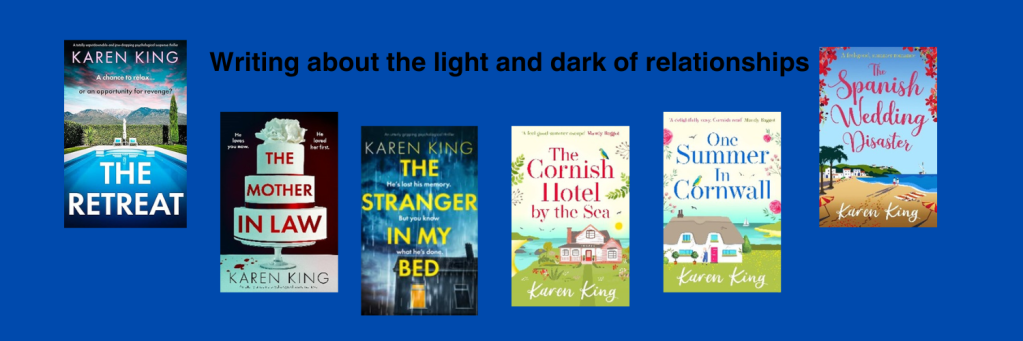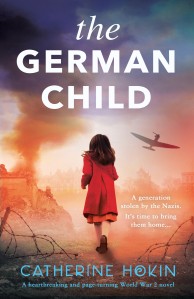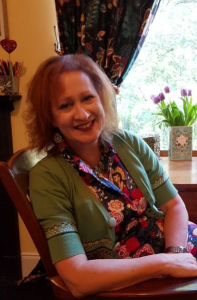Welcome to another Friday Reads post. 😊 My featured book today is the historical WW2 novel, The German Child, by Catherine Hokin. It looks an amazing read and Catherine has dropped by to tell us the background behind it, so grab yourself a cuppa, get cosy and let’s get chatting to Catherine. 😊
Blurb:
Berlin, 1944. ‘No! Not my child!’ Annaliese screams, her voice breaking as she pounds the window uselessly. But no-one looks up as the man in the SS uniform cradles her precious baby and strides away…
She lies unmoving on the threadbare cot, her throat hoarse from long hours of screaming but her tears keep falling. Her heart has been cleaved in two, now the Nazis have taken the only thing she has left – her child. She is utterly powerless against them. But as Annaliese cries herself to sleep, she makes a vow – she will find her precious baby again. Whatever it takes.
Berlin, 1979. Lawyer Evie has come to the city to investigate the horrifying stories of infants torn from their mothers during the war. One of the cases is Sebastian, whose yellowing birth certificate tells a heartbreaking tale. Evie is drawn to this lost man, and vows to do all that she can to help him.
But poring through old records, it is Evie who recognises the faded photo in a newspaper article. Her heart stops as she realises her whole life has been a devastating lie – and that her and Sebastian’s pasts are impossibly, unimaginably connected…
Buying Link:
https://geni.us/B0CL4V36NQauthor
Short Extract:
CHAPTER ONE
Poland, September 1941
The women came as they always came. Huddled, bleating. Clutching their children as if they still had a claim to them. Trapped like flies in sticky amber by a summons which had ground their small town to a halt.
All children up to and including the age of twelve are to report to the Ogrodowa Street schoolyard on Sunday, 21 September at 2 p.m. Mothers only are to accompany them. Two weeks of residential care will be provided while parents are assessed for appropriate work placements. One small suitcase of clothing suitable for outdoor activities is required per child. Feeding equipment should be provided for infants.
By order of Hans Frank
Head of the General Government, Kraków
19 September 1941
No one reading the sign had dared to say what they wanted to say: that nothing about its wording made sense. Nobody had dared to point out its obvious flaws. That care was an alien concept to the Nazis who ruled them with such a brutal hand. Or that, after two years of German occupation and hardship, there wasn’t a child anywhere in Poland with enough decent clothes to fill up a suitcase. Or that life nowadays ran on orders and punishments and no one was assessed for anything. And none of the parents whose hearts stalled as they read and reread the black type were able to cling on to ‘I’ll fight back; I won’t do what they want’ for more than a fleeting moment.
Not that it matters if anyone does decide to play the fool and hide them. We have their names. We’ll track them all down in the end.
Welcome to my blog, Catherine. Can you tell us what gave you the inspiration to write this novel?
The German Child is my ninth novel for Bookouture, so “where do you get your inspiration from?” is a question I’m regularly asked.
My first Bookouture novel, The Fortunate Ones was based on a short story I’d written after sitting in a café in Budapest watching a very tense couple arguing. Since then (and fingers crossed it continues) my stories have led to more stories.
I spend a lot of time researching my books and there’s always a moment during that process when a phrase or a reference jumps out of the source material and makes me think, oh that’s interesting, that could be another one…
With The German Child, the starting point came while I was working on Her Last Promise, the final part of my Hanni Winter series set around the Theresienstadt ghetto, and a passing reference to the ‘Brown Sisters’ playing a key role in the mass kidnapping of ‘Aryan’ children across occupied Europe during World War Two. That was it but Brown Sisters was more than enough: I knew they had to feature in my next story. I made a note, and then I did what experience has taught me to do, and let the next part of the process happen… Waiting for the second idea to pop up and become a match for the one that’s lurking.
That came a month or two later when someone suggested I watch the tv drama Hunters which follows a group of Nazi hunters in 1970s New York. I gave up on that very quickly but I was intrigued enough to wonder if anyone was genuinely looking for Nazis in America then, given how many German scientists had been brought into the country at the end of World War Two. That I wonder, led me to the Office of Special Investigations which was set up in Washington in 1979 to uncover the truth about the so-called “quiet neighbours,” the ex-Nazis recruited to assist the US with the Cold War space and nuclear race.
By now I knew a little more about the Brown Sisters: they were child-catchers, trained to identify children suitable for Germanisation in the countries occupied by the Third Reich. They wore brown dresses, they were drab and deliberately invisible. Few people saw them, but the fear of their coming swallowed up whole communities. And what of the dozens of German Nazis living anonymous lives in America? The men brought to the USA with their pasts not only overlooked but deliberately buried? The similarities were so strong: two groups of ordinary people who’d done or were doing terrible things while surrounded by layers of protection and/or disbelief. Two groups hiding in plain sight.
Monsters we choose not to see. The quiet neighbour. The kind doctor. The people we never question, the people we unthinkingly trust. It’s an all too familiar story and – thanks to an easily overlooked reference and a very odd tv show – it gave me the start of mine.
That’s so fascinating, Catherine, and your book sounds a fantastic read. Thanks so much for popping by to talk to us today. Wishing you lots of writing success.
Meet Catherine
AUTHOR BIO:
I am from the North of England but now live very happily in Glasgow with my American husband. If I’m not at my desk you’ll most probably find me in the cinema, or just follow the sound of very loud music. I write fulltime after a very varied career spanning marketing, teaching and politics and my books are set primarily in Berlin, covering the period from 1933 up to the fall of the Berlin Wall and dealing with the long shadows left by war. I am a story lover as well as a story writer and this period really fascinates me. Writing about it also means that I get to spend a lot of time in Berlin, which is a city I love.
LINKS:

Amazon Author Page: https://www.amazon.co.uk/Karen-King/e/B0034P6W7I
Website: https://karenkingauthor.com/

